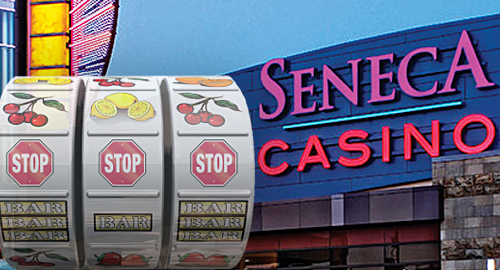 The Seneca Nation of Indians has decided to stop sharing its casino revenue with the state of New York, effectively picking the scab off an old tribal-state wound that had only just begun to heal.
The Seneca Nation of Indians has decided to stop sharing its casino revenue with the state of New York, effectively picking the scab off an old tribal-state wound that had only just begun to heal.
On Wednesday, the Senecas announced that their three upstate casinos in Buffalo, Niagara Falls and Salamanca would cease providing the state with a 25% share of their slot machine revenue as of April 1. The tribe has anted up nearly $1.5b to the state over the life of its tribal-state compact, which was signed back in 2002.
The Senecas insist that they’re acting within the terms of their compact, which called for an initial term of 14 years, with an option to extend the compact for a further seven years. The compact is now in its 15th year, and the tribe says there’s nothing in the extension language that requires them to continue making the payments.
State officials were reportedly caught off guard by the Senecas’ decision, but the Buffalo News quoted an unidentified Seneca representative saying the tribe’s stance was “nothing new. It’s what the compact says in black and white language.”
Seneca president Todd Gates issued a statement suggesting that the tribe could work out a deal with its casino host communities that have reaped $368m via the revenue sharing arrangement. Gates said the tribe is “committed to being good neighbors” and looked forward to “working directly with [host cities] to continue the economic progress of Western New York.”
The Senecas were reportedly miffed by the state’s 2015 decision to issue three commercial casino licenses, including the del Lago Resort & Casino in Seneca county, which opened on February 1. The del Lago generated revenue of over $13m in its first month of operation but the tribe has been mum about how its own casino revenue has been impacted by the new competition.
In 2013, the Senecas resolved a long standoff with the state over Western New York racetracks adding slots to their gaming mix. The Senecas had withheld some $630m in payments based on their belief that the state’s approval of the racinos had violated their compact’s regional exclusivity rights.
The dispute was a heated one, including Gov. Andrew Cuomo threatening to authorize a commercial casino in Niagara Falls if the tribe didn’t make with the money. The state eventually admitted that it had violated the compact and allowed the tribe to keep $200m that otherwise would have gone to the state.
The state’s share of the Senecas’ slots revenue amounts to around $110m per year, making Wednesday’s announcement sure to get Cuomo’s attention. New York is currently crafting its latest annual budget, and that big a revenue hole could bode well for the state’s chances of approving legal online poker play.